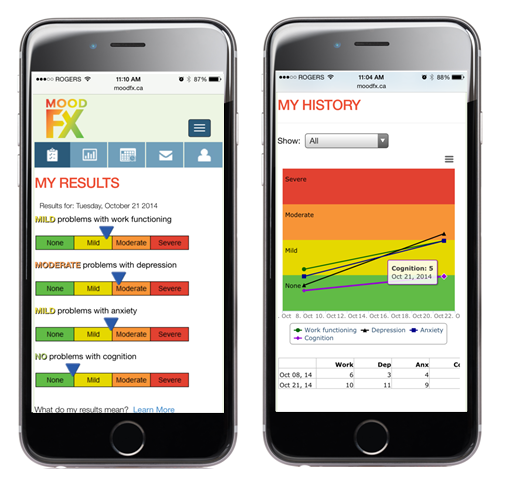Searching for an app to track your moods? Choices abound: Moody Me, MoodPanda, HappyApp and Depression Cure.
But professional-grade tools are scarce. UBC faculty members, sensing a need, went to work.
The result is MoodFx, a new mobile-friendly web tool based on questionnaires that physicians use to track their patients with depression.
“Why not put the tools in the hands of the patients themselves to track how things are going?” says Raymond Lam, Professor in the Department of Psychiatry and Director of the Mood Disorders Centre, who led the development of the website by the Mood Disorders Centre at UBC Hospital and the UBC eHealth Strategy Office.
MoodFx was designed to help people not only track how they feel but also objectively evaluate their ability to function and work – a feature that attracted a $150,000 contribution from Lundbeck Canada that made the project possible.
“Depression affects the working-age population and places a huge burden on productivity, both business and societal,” says Patrick Cashman, President and General Manager of Lundbeck Canada, a Montreal-based pharmaceutical company specialized in brain diseases. “Our purpose is to challenge the status quo because Canadians living with brain disease deserve better. An app helps take that to the patient level and gives meaningful information physicians can use during treatment. That’s why we wanted this project to go forward.”
Launched to a standing-room only crowd at the annual meeting of the Canadian Psychiatric Association in September, MoodFx enables users to work with their mental health care providers to track outcomes before, during and after treatment.
Using validated questionnaires to assess a person’s depression, anxiety, cognition and work performance, MoodFx can screen for depression and anxiety problems to see whether a user should seek help.
For people in treatment, MoodFx provides reminders to check symptoms regularly and before appointments with their family doctor, psychiatrist or counsellor. MoodFx also charts the results over time so that patients can print or show their charts to their health care provider from a smartphone or tablet. Information is stored anonymously and securely.
The MoodFx web app also has the capability of sending patients helpful weekly tips for managing depression, anxiety and problems with cognition and work stress.
“This tool is not only patient-friendly but also health professional-friendly,” says Kendall Ho, Professor in the Department of Emergency Medicine and Director of the eHealth Strategy Office. “It promotes patients and health professionals as strong partners in improving health, depression and anxiety in the workplace.”
The project team is holding workshops and webinars to teach clinicians how to use MoodFx with their patients; it’s also being promoted to mental health advocacy and patient groups. Plans are under way to evaluate the tool’s usability and effectiveness in improving patient outcomes.
Depression is one of the leading causes of disability world-wide, especially in working-age adults. In Canada, as many as seven in 10 people with clinical depression continue to work, despite struggling with their symptoms.
“Lundbeck Canada recognized the immense impact and burden of depression on work functioning, and the challenges for busy clinicians to monitor symptoms and functional outcomes during treatment,” Dr. Lam says. “They identified this project as an important step to improve measurement-based care by leveraging the ubiquity of mobile technology.”

